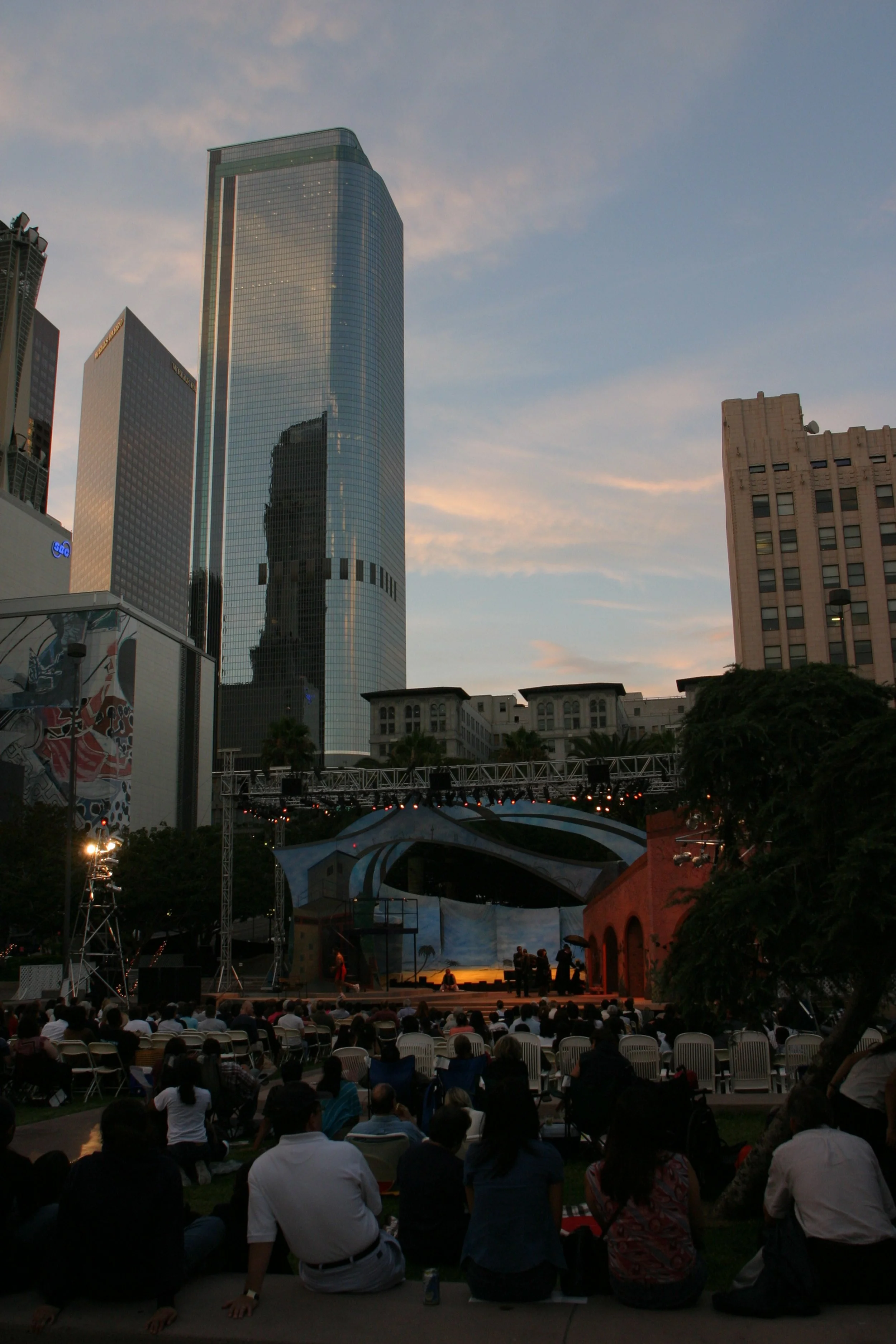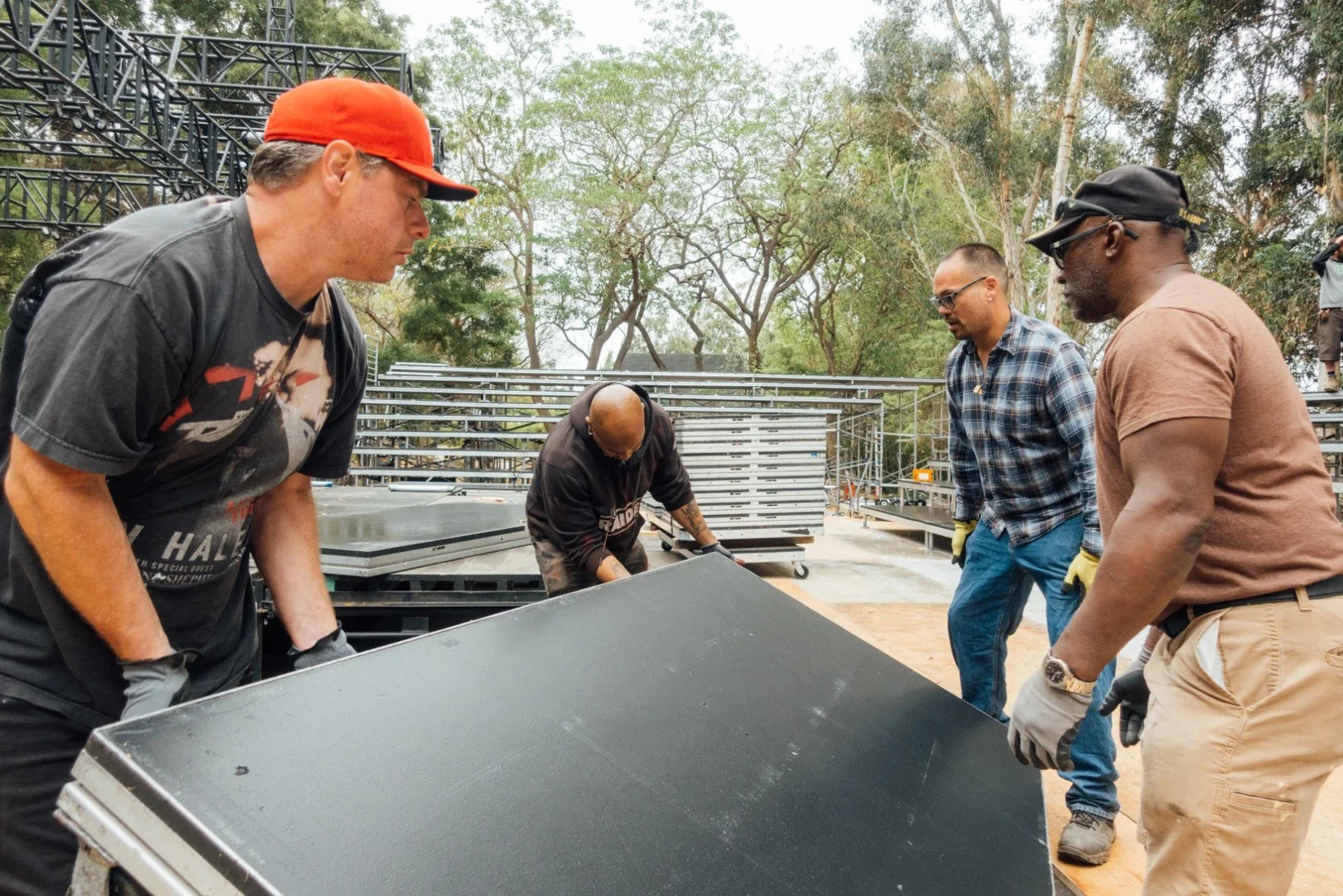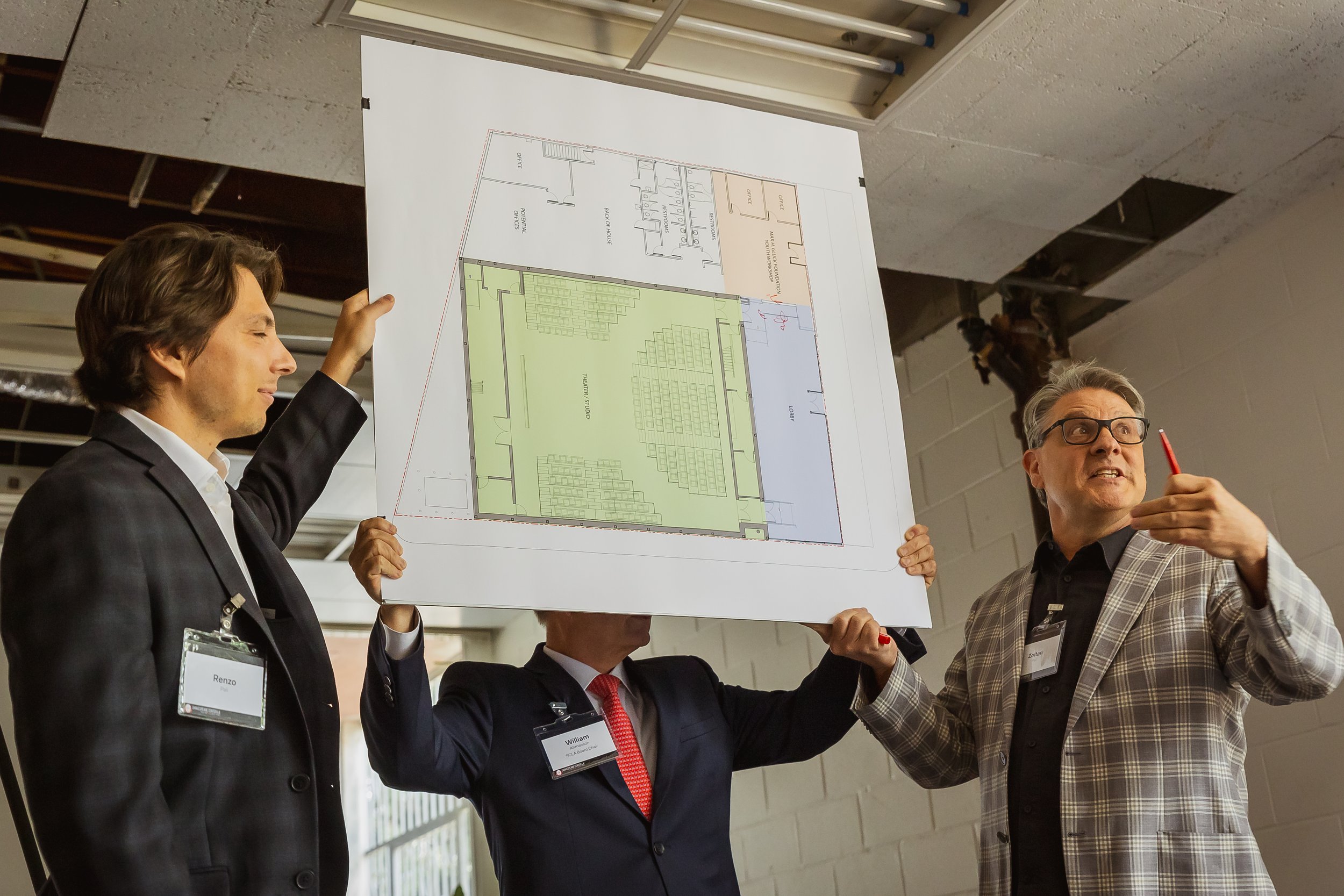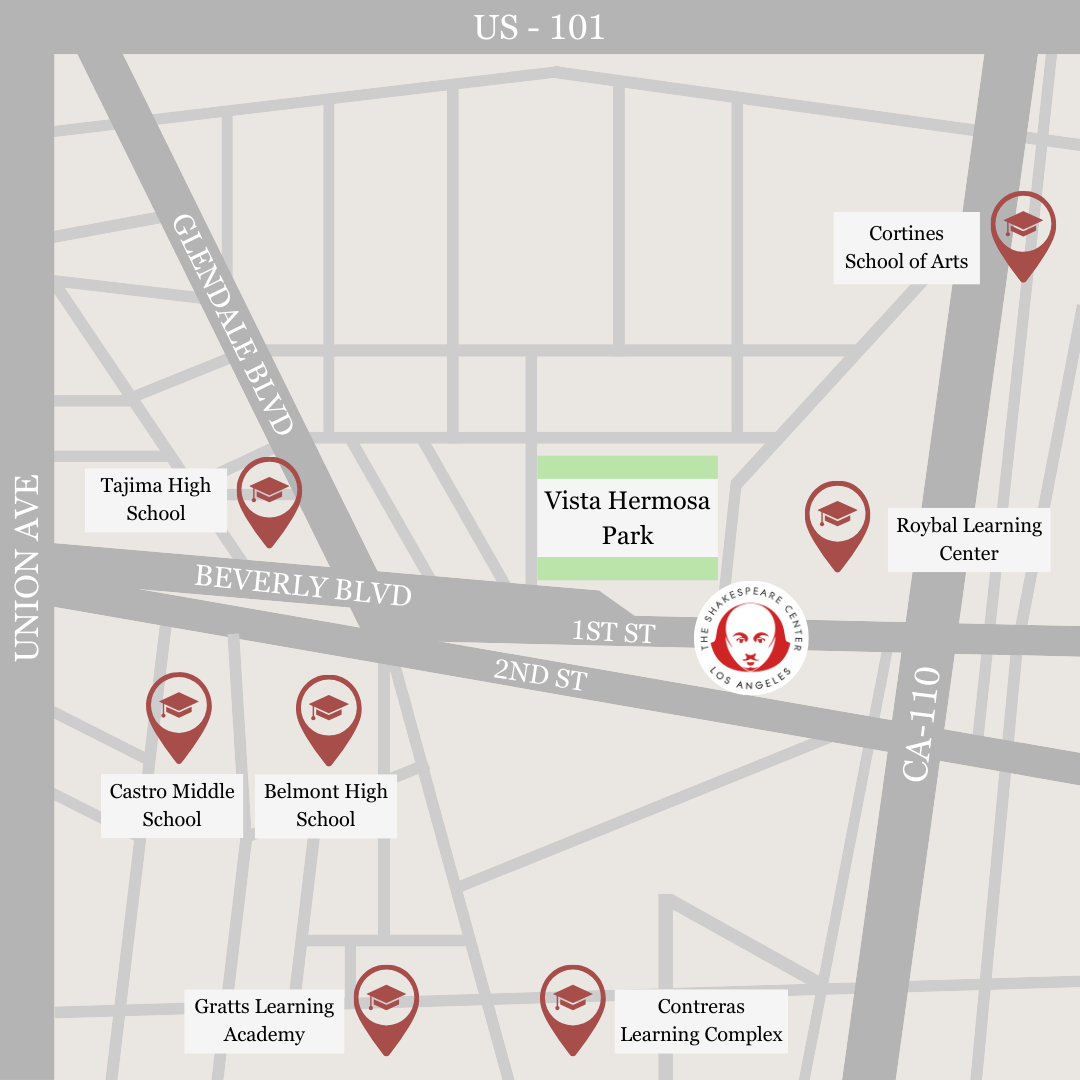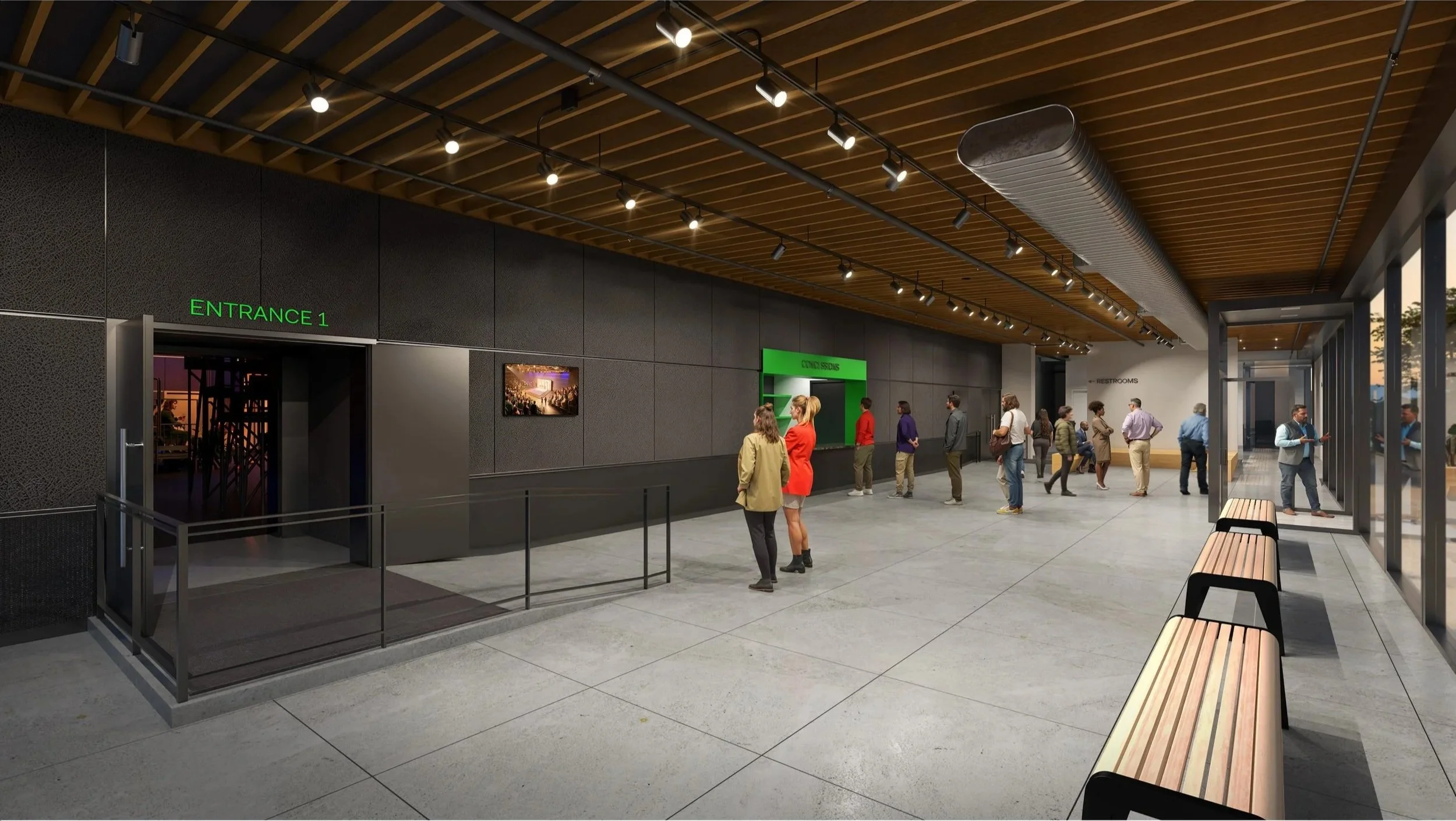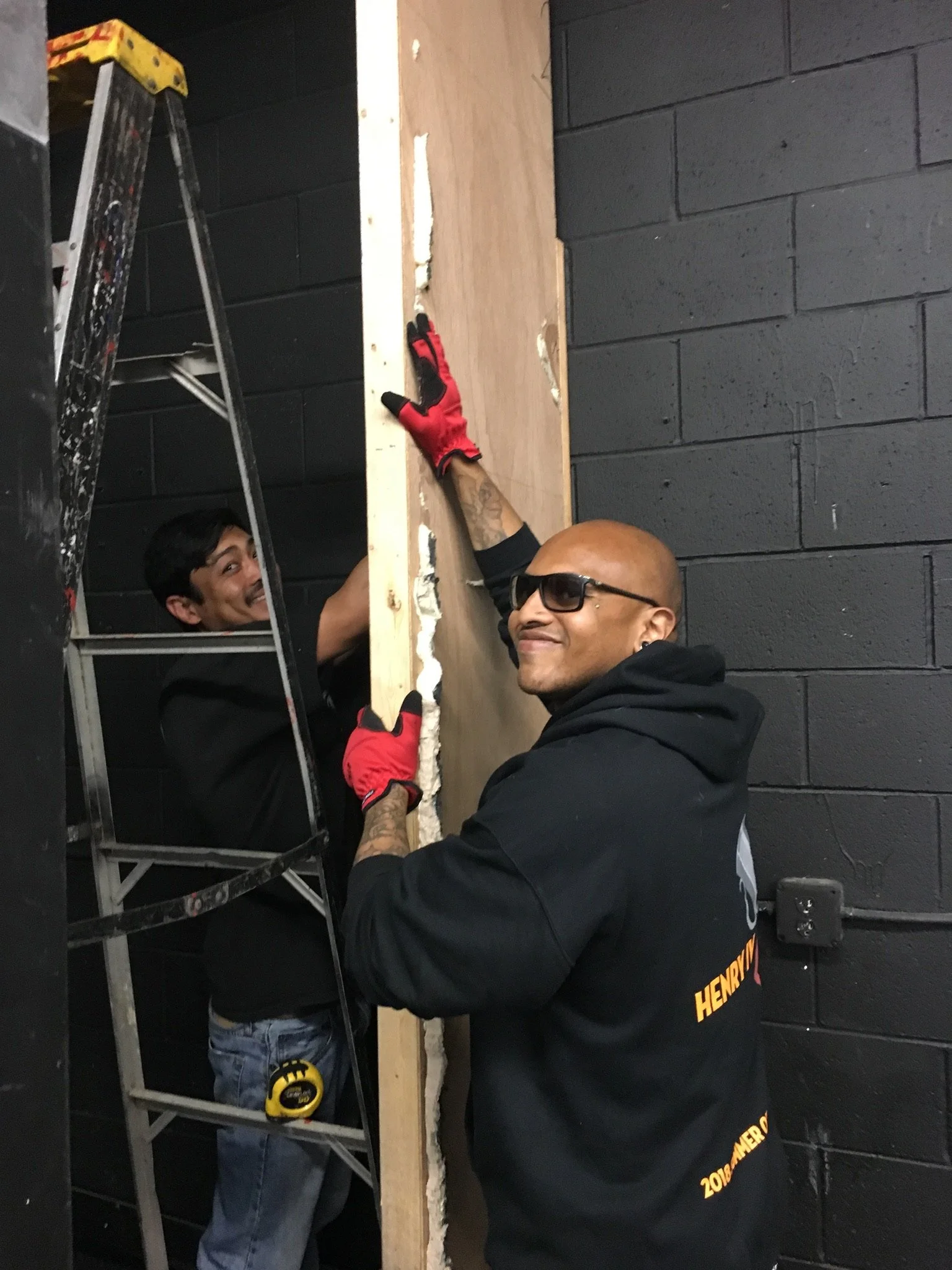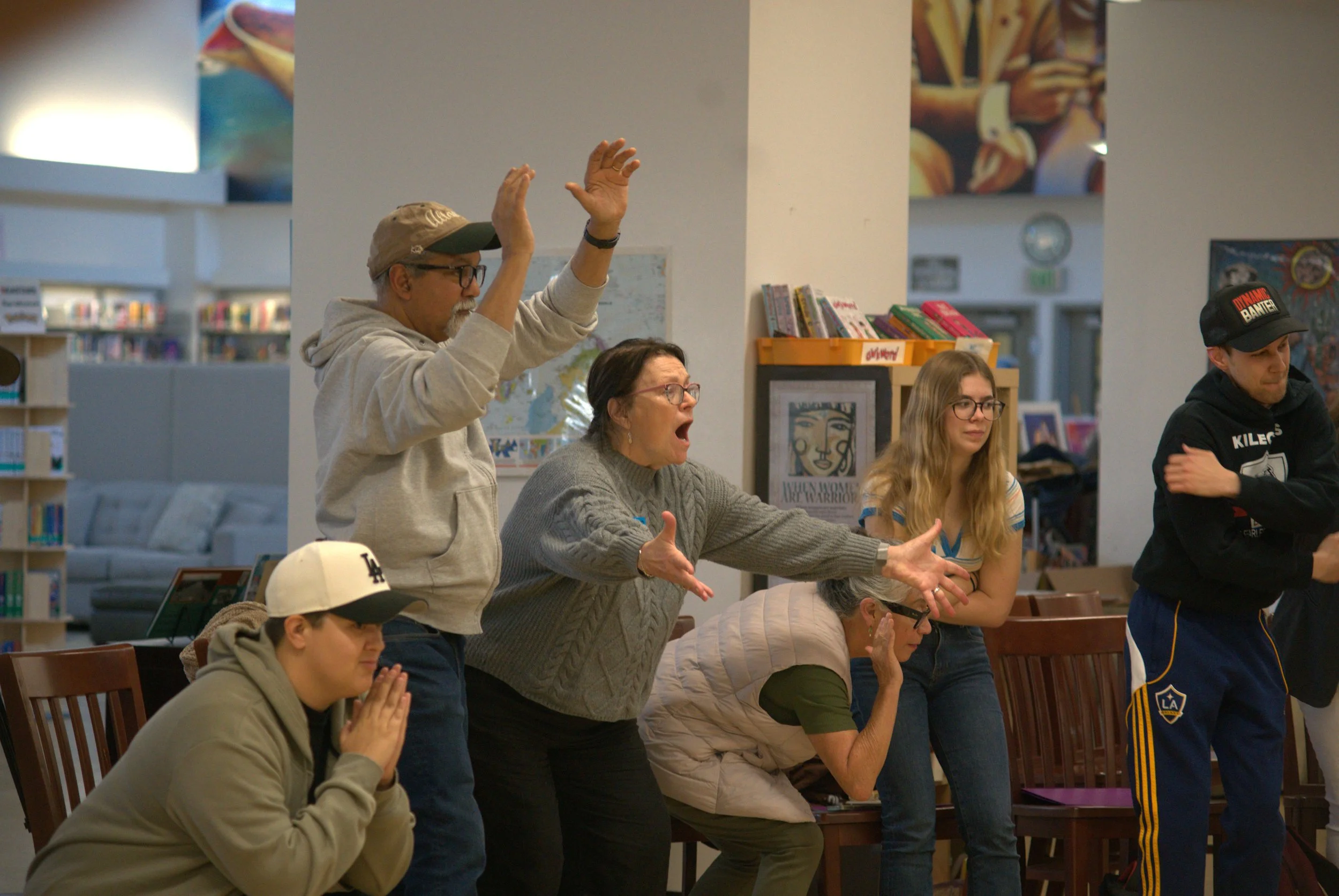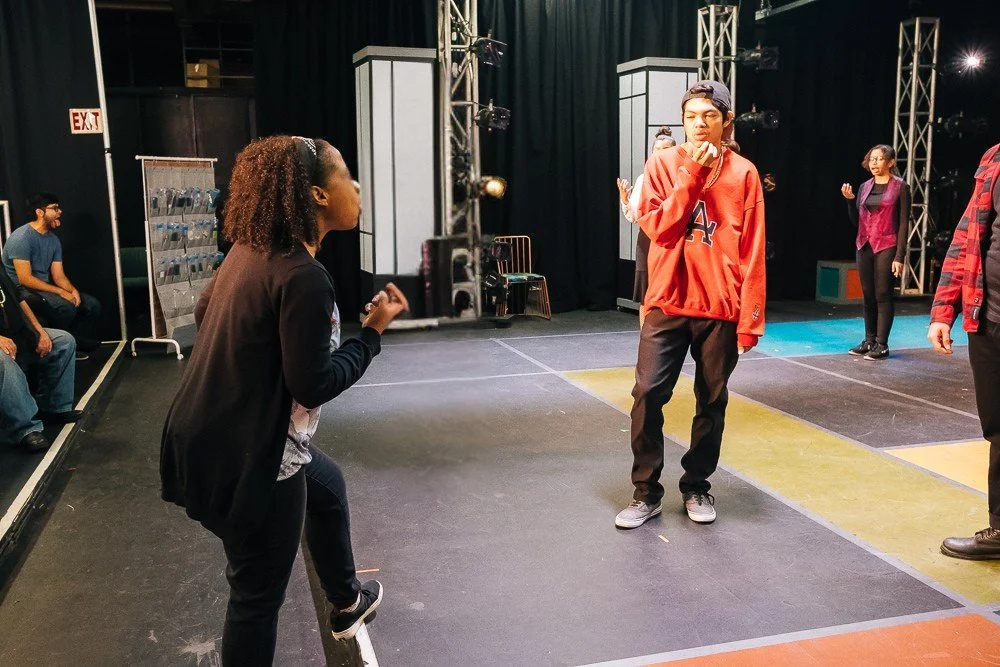The Shakespeare Center
Inspires, Empowers and Serves
Our Comprehensive Campaign to ensure that the Shakespeare Center of Los Angeles has the facilities and resources needed to continue its 40 year legacy of producing award-winning, contemporary interpretations of Shakespeare’s plays and other great works while serving the community through nationally recognized workforce training, arts employment, youth development, and arts education programs.


Overview
The Shakespeare Center is currently engaged in a multi-year comprehensive campaign to transform its existing building into a flexible, 300-seat multimedia theater and storytelling space that improves on its nearly 40-year history as an arts education and workforce training center dedicated to youth, military veterans, and underserved communities. When completed, our project will result in increased access to arts and cultural enrichment for underserved communities; measurable economic development; improved business viability and public safety; and long-term systems change. Our newly renovated facility will present a full season of professional theatrical productions and student matinees for Title 1 schools; provide workforce training, art employment, and arts education programs for veterans, underserved youth, and teachers; and serve as a resource for independent theater companies and entertainment professionals.
We have occupied our current facility since 2000 and recognize that the socio-economic challenges facing our surrounding communities of Downtown LA, Rampart Village, Westlake, and Echo Park have only increased as the population increases. The SCLA is located in a census tract that falls within the lowest quartile of the California Healthy Places Index®, with community conditions ranked at 9.86 out of 100. According to the Community Development Financial Institutions PolicyMap, our corridor is categorized as being in Severe Distress with a 33% poverty rate and 12% unemployment. This demonstrates the challenges faced by the residents, schools and businesses of our neighborhood
The SCLA is proud of the impact we have made here in Los Angeles and in the American Theater over these past decades. We also understand that we must continue to meet the moment, deepen our relationships with our neighbors, and meet the essential needs of Los Angeles residents, specifically those who live in close proximity to us.
1993
SCLA expands to offer the workforce development program Will Power After-School. Will Power After-School serves poverty threshold youth ages 14-24, who are hired as full-time, paid employees to study, create, produce, and perform adaptations of Shakespeare’s plays.
2012
SCLA launched Veterans in Art (ViA), a program offering short-term paid vocational training in technical theater arts and life-skills development for high-need, chronically underemployed, honorably discharged U.S. military veterans.
1986
SCLA presents its first production of Twelfth Night in Pershing Square
2000
SCLA purchased and moved into its permanent downtown headquarters
2024
Our Groundbreaking
On May 25, 2024, we broke ground on our largest endeavor to date; the transformation of our existing facility into a 22,000 sq. ft multi-use theater and state-of-the-art sound stage, and production rental facility. The award-winning architect Zoltan Pali and SPF:architects have been charged with helping to make the best use of the existing structure while broadening its community service potential. The structural engineer selected to provide engineering expertise is the highly regarded Nabih Youssef.
When our facility’s capital improvements are completed, the new 22,000 sq. ft. Shakespeare Center will include:
A state of the art 300-seat multimedia performance space fully equipped and convertible to a functioning 7,000 square foot rental soundstage.
A new theater ceiling height of 30 feet (current is 16 ft.) allowing for increased production capabilities.
Workforce training center and learning labs that will provide multiple theater based vocational training programs for underserved youth; under-resourced educators and teaching artists; chronically unemployed military veterans; and formerly incarcerated community members.
“The Shakespeare Center’s Penny University,” which will offer free arts and cultural enrichment programs such as lectures, art exhibits, film screenings, readings, and more throughout the year.
A coffee shop, Shakespeare library and gift shop open to the public daily.
While under construction, we are continuing to operate our arts education, youth employment, and adult workforce training programs offsite with community partners while building our internal capacity to successfully deliver expanded programming in the future. We will also present performing arts experiences at offsite partner venues designed to deepen our connections with new and diverse audiences and solicit community input for future SCLA programs.
To complete construction on time, reopen the facility, and fully resource our expanded programming, we, along with our artists, donors and strategic partners, have launched this Comprehensive Campaign which represents our institutional commitment to ensuring that the SCLA remains a permanent home for inspiring mainstage productions; empowering workforce training and arts education programs; and community serving initiatives that revitalize and uplift our surrounding neighborhood.
Urgently Needed Expansion
The Shakespeare Center is uniquely positioned and extremely fortunate to be a debt-free, sole owner of its downtown facility located on First Street, just a few blocks northwest of Bunker Hill, home of the Grand Ave. Cultural District. Originally constructed as a warehouse and acquired by the company in 2000, the most significant deficiency of the space was a ceiling height of only 16 feet, severely limiting the ability to present high-quality theatrical productions and to schedule other potential commercial uses. It also lacked adequate facilities to serve the increased community demand for our workforce training and arts education programs.
Current Stakeholders
To date, SCLA has secured more than $18 million for the project, including generous contributions from The Ahmanson Foundation; the California Arts Council with the support of Senator María Elena Durazo; the U.S. Department of Commerce Economic Development Administration; the City of Los Angeles Economic and Workforce Development Department; The Perenchio Foundation; and the Max H. Gluck Foundation.
Other major stakeholders include the Los Angeles Unified School District; Los Angeles Development Fund; U.S.VETS; the offices of Los Angeles County Supervisor Hilda L. Solis, First District and L.A. City Councilmember Eunisses Hernandez, District 1; the City of LA Department of Cultural Affairs and LA County Department of Arts and Culture.
Capital Improvement Phases and Project Status
Phase One
The Center will complete Phase One of its capital improvements in August of 2025. This initial phase included major construction and building renovations such as the installation of critical switchgear equipment; structural concrete improvements and reinforcement; new electrical rough-in and underground utilities. Most importantly, the studio roof and ceiling has successfully been raised from its former 16ft. height to 30ft.
Status: Fully Funded
Winter/Spring 2024-25
Phase Two
As Phase One now meets completion, the Center must prepare for seamless transition into the project’s final Phase Two. This phase begins in September of 2025 and will be completed in the spring of 2026, allowing the SCLA to re-open for year round public programming. Critical components of the second phase are interior renovations to satisfy all requirements for the issuance of a Certificate of Occupancy; the completion of the 300-seat multimedia theater; rental sound stage; media arts training lab; youth and veterans’ workforce training and educational areas; lobby and community gathering spaces; library and gift shop spaces; and all staff offices.
Status: 72% Funded
May 2024
June 2025
Grand Opening 2026
Current Funding Needed
The estimated budget for Phase 2 of our capital improvement project is $5.5 million. To date we have secured $4 million for Phase 2, and need to secure an additional $1.5 million in contributions, program related investments, and/or pledged multi-year capital grants in 2025. This will ensure that construction continues uninterrupted and that staff are able to fully develop our season of mainstage productions and expanded programming in anticipation of our 2026-27 Grand Opening.
Anticipated Community Impact
Upon completion of our project, the Center will present a season of professional theatrical productions for an estimated 15,000 audience members annually; will substantially increase the scale and scope of the community benefits we offer; and will serve as a leader in the economic development of our surrounding area. We will also have successfully brought together dozens of stakeholders in the philanthropic community; local, state and federal government agencies; school districts and higher education institutions; and community members and artists from all backgrounds.
Funding provided by major donors would support our efforts over the next seven years to fulfill our promise to deliver the following:
Community Enrichment via Live Performance and Multimedia Storytelling
42,000 subsidized student matinee tickets
14,000 subsidized tickets for veterans
28,000 market priced affordable tickets
Workforce Development
740 jobs for poverty threshold youth
280 jobs for honorable discharged and chronically underemployed veterans
Arts Education
Professional Development seminars for 700 Los Angeles teachers
Professional Development seminars disseminated online to 2,800 teachers via asynchronous modules available OnDemand.
Development, publication, and dissemination of new Curriculum and Lesson Plans
Community Benefits Agreement
In exchange for an allocation of federal New Market Tax Credits (which were converted into $3.75 million through a NMTC transaction), the Shakespeare Center entered into a formal mission driven Community Benefits Agreement (CBA) that underscores the need and necessity for the expansion of its unique brand of art-making paired with measurable service-oriented impacts and outcomes. The CBA also assures USBank, the purchaser of the tax credits, that its investment in SCLA’s mission driven growth will sustain its operation and non-profit activities over a mandated contractually obligated seven year tax credit amortization period.
Underserved Youth Served
Veterans Served
Subsidized Tickets To Students At Title 1 Schools
Subsidized Tickets To Veterans
Teachers At Title 1 Schools Served Through Partnerships
The Vista Hermosa Cultural Gateway:
A Creative Placemaking Initiative
The Shakespeare Center of Los Angeles recently launched a multi-year Creative Placemaking initiative focusing on community building and neighborhood transformation. In partnership with a wide range of stakeholders, we are seeking to establish The Vista Hermosa Cultural Gateway, a new arts corridor that begins at the foot of the First Street Viaduct Bridge over Glendale Blvd. and the entrance to Vista Hermosa Natural Park.
This new endeavor is a key component of our long-term institutional vision and reflects our commitment to deepening our relationships and building alliances with surrounding LAUSD schools such as Roybal Learning Center, Cortines School of the Arts, Belmont High School, Tajima High School, Los Angeles Academy of Arts and Enterprise (LAAAE), and Contreras Learning Complex; neighborhood councils representing Downtown Los Angeles, Westlake North, and Echo Park; public safety and public services agencies; city, county, state, and federal elected officials; enrichment and recreational centers; local businesses; and civic associations such as the Los Angeles Area Chamber of Commerce. Our new “Cultural Gateway” serves as the entry point to the recently designated Grand Avenue Cultural District in Downtown LA and will spearhead public safety and business investment initiatives to contribute to the creation of a vibrant cultural identity and signature destination point celebrating one of the oldest and most densely populated communities in the City of Los Angeles.
The geographic region of the Vista Hermosa Cultural Gateway is bordered by Temple St. to the north, Figueroa St. to the east; 3rd. Street to the south and Union Ave. to the west.
Major Goals & Objectives:
Increase Public Safety, Livability and Pedestrian Mobility
Create a Calendar of Arts & Culture Events that
Engage All Community Members
Increase Small Business Investment
Maximize Parking Availability for Events
Neighborhood Beautification
Activities & Initiatives:
Arts & Music Festivals and Free Cultural Events
Block Parties and Barbeques
Farmers Market Under 1st St. Viaduct Bridge
Support Community Input Gathering Sessions
Mural Restoration and Maintenance
Neighborhood Preservation Walking Tours
Principal Naming Opportunities
The Storybox: A Multi-Media Theater and Performance Space
$2.5 Million
Standing as a beacon for community transformation through arts-based economic development, The Storybox is City West’s Gateway to the Downtown Los Angeles Cultural Corridor and home of The Shakespeare Center of Los Angeles. SCLA’s Mainstage Productions will take place in this state-of-the-art facility and are performed by professional actors with special Student Matinee performances offered to Title 1 schools. The Storybox is uniquely equipped as a state-of-the-art performing arts storytelling space, a multimedia recording and broadcast studio, a teaching and learning campus, and a welcoming place for community gatherings, robust discussions, and cultural celebrations. Through pioneering cutting-edge multimedia storytelling techniques and preserving age-old, tried and true means and methods, The Storybox dedicates its resources to inviting all Angelenos’ of all ages to share stories. At the completion of the seven year CBA period, The Storybox will generate approximately $21 million of economic impact. This is roughly equivalent to the current amount of capital investment in the current improvement project.
SCLA must continue to build capacity and expand services in order to scale from the current $1,200,000 of annual economic activity to annually generating $3,000,000 in economic activity. To fully realize the promise and potential of The Storybox, new and increased earned, contracted, and rental income will augment the annual gifts supporting our general operations. Increased seating from 175 to 300 will also elevate per show box office earned income by 42%.
$2.5 Million supports 42,000 subsidized Student Matinee tickets at the approved LAUSD value of $40 per ticket rate ($1,680,000 value); 14,000 subsidized tickets for Military Veterans priced at the same rate ($560,000 value); and 300 retractable theater seating system at $2,000 per seat ($600,000). An investment in this range may be paid in annual installments over an agreed upon number of years, through a number of different tax deductible options.
The Shakespeare Center’s Penny University
$1 Million
The very first coffeehouses in the English-speaking world emerged in 17th-century Britain. Because the charge for a cup of coffee was a penny, they were called “Penny Universities.” The Penny Universities were dynamic, vibrant gathering places for a cross-section of academics, artists, working class citizens, and intellectuals. These hubs democratized learning, opening avenues for people of all backgrounds to engage in discourse — particularly those who could not access higher education. The Shakespeare Center’s 3,000 square foot lobby will operate in the tradition of a Penny University coffeehouse loosely modeled on its 17th-century prototype. It will be a place for discussion, exchanges of ideas, film screenings, music, curated gallery installations, community gatherings, and annual professional development seminars for in-service teachers. Interested youth and veterans can also be trained to develop barista skills and prepare for employment in the growing coffee and retail food service industry.
Our Penny University’s high-speed internet access and designated quiet zones, including its adjoining Shakespeare Garden, will be available to provide the 6,000+ high school students attending Belmont Senior High School, Edward Roybal Learning Center, and Miguel Contreras Learning Center, all within a two block walking distance, a safe and supportive after-school social gathering space. Over the seven year CBA period, it is anticipated that a minimum of 200,000 people will pass through The Penny University coffeehouse and participate in arts enrichment, arts employment, arts education, and arts-based workforce development experiences.
$1.5 Million
This technical theater, costume and scene shop will provide 40 U.S. military veterans annually with short-term paid workforce training annually through our award-winning Veterans in Art program. ViA provides employment and life-skills development for high-need, chronically underemployed, honorably discharged U.S. military veterans. ViA builds confidence and community for veterans who are struggling with reentry to civilian life.
$1 Million provides 200,000 FREE Cups of Coffee ($650,000 value) and over 80 FREE cultural engagement events ($350,000 value) for the youth, families and audiences who will gather in our Penny University.
Veterans in Art (ViA) Training Center
$1.5 Million supports 280 workforce training and paid internships for chronically underemployed veterans. Each of the internships are approximately 300 hours @ $6,000 each over seven years and will transform the lives of veterans seeking a pathway to the mainstream civilian workforce ($1,680,000 value).
Will Power Workforce Training and Shakespeare Learning Labs
$2 Million
Our Will Power Workforce Training and Shakespeare Learning Labs will provide workforce training and arts based youth employment opportunities for underserved students through workshops led by trained teaching artists and industry professionals. The facility will be a center piece of SCLA’s Will Power After School program which serves youth aged from 14-24 who are hired as full-time, paid employees to study, create, produce, and perform adaptations of Shakespeare’s plays. It will include multiple Media Art Labs and workshop spaces.
Our Will Power to Schools program will take place in multiple Arts Education Classroom spaces and will offer in-service teachers at schools throughout LAUSD with accredited in-person professional development seminars, arts integration training projects, and free innovative curriculum materials.
$2 Million supports 740 arts employment opportunities for poverty threshold youth attending LAUSD Title 1 schools over seven years. Each participant works 120 hours per year at $17.87/hr ($1,586,856 value) Your investment also supports professional development seminars for 700 Los Angeles teachers and over 2,800 online seminars nationally ($500,00 value).
Consider Joining Our Communities of Support
With the support of philanthropic foundations, government arts and economic development agencies, corporate partners, and the generous gifts of individual donors, we have been able to enter the final phase of our capital improvement project; meet our mission; and substantially improve our institutional capacity. As we enter the final stretch of our years-long effort to increase our community impact, we invite you to consider joining our Communities of Support campaign and help us complete the expansion of our new facility and fulfill our promise to underserved youth, veterans, teachers and artists.
Contributions include a Partner Membership ($500 value) valid for 2025 AND all of 2026.
$1,000
All of the Partner member benefits, plus…
4 tickets to a 2026 mainstage experience
2 invitations to an opening night reception
Recognition on our donor wall
Social media shout out
$2,500
All of the above, plus…
2 tickets to our 2026 Bard Benefit event
Recognition on our donor wall
$5,000
All of the above, plus…
5 tickets to our 2026 Bard Benefit event
Recognition on a donor plaque
E-blast thank you to our 16,000 person email list
$10,000
All of the above, plus…
12 tickets to our 2026 Bard Benefit event
Backstage meet and greet with actors and artistic team of Bard Benefit or mainstage experience
Major recognition on a donor plaque
$25,000 to $99,999 receive:
Recognition on the Comprehensive Campaign Donor Wall located in the lobby of the Shakespeare Center Building.
Recognition as a Shakespeare Center Donor on our website, all publications and on all distributed virtual materials.
Gifts of $100,000 and more will receive all of the above benefits plus…
Recognition as a Major Donor on the Comprehensive Campaign Donor Wall located in the lobby of the Shakespeare Center Building.
Exclusive public recognition on a plaque or in signage directly related to the facility or chosen capital element.
Other customized donor recognition opportunities.
Additional Naming Opportunities
Founders Room - $750,000
West Entry Vestibule - $250,000
East Entry Vestibule - $250,000
Box Office - $250,000
Concessions/Espresso Bar - $250,000
Library - $200,000
Technical Booth - $200,000
Dressing Room - $200,000
Entry Fence - $100,000
Artistic Director’s Suite - $100,000
Backstage Crossover - $75,000
Men’s Restroom - $75,000
Women’s Restroom - $75,000
Cast Restroom - $75,000
Storage and Supply Cabinet - $50,000
Theatrical Equipment Storage - $50,000
Positions Available For Naming
Artistic Director - $2,000,000
Managing Director - $1,000,000
Community Engagement Director - $1,000,000
Thank You for Your Support
As we enter our fourth decade, it is clear that we must invest in a permanent home for new and innovative theater and multimedia storytelling that embraces and reflects the diverse voices of our community; provides workforce training and employment in the arts to those who need it most; and supports schools that lack professional development resources and educational tools. We must also be a leader in the economic development and revitalization of our Vista Hermosa neighborhood corridor while increasing access to arts and cultural enrichment for underserved communities. And, as the destination in Los Angeles for populist interpretations of Shakespeare, we must continue to ask, “How does Shakespeare, a Renaissance Humanist, meet the moment?”, and seize opportunities to amplify critical humanist questions and evoke artful storytelling that appeals to audiences from all walks of life.
For more information, please contact Development Director Joel Settles: Joel@shakespearecenter.org; (213) 238-0555

